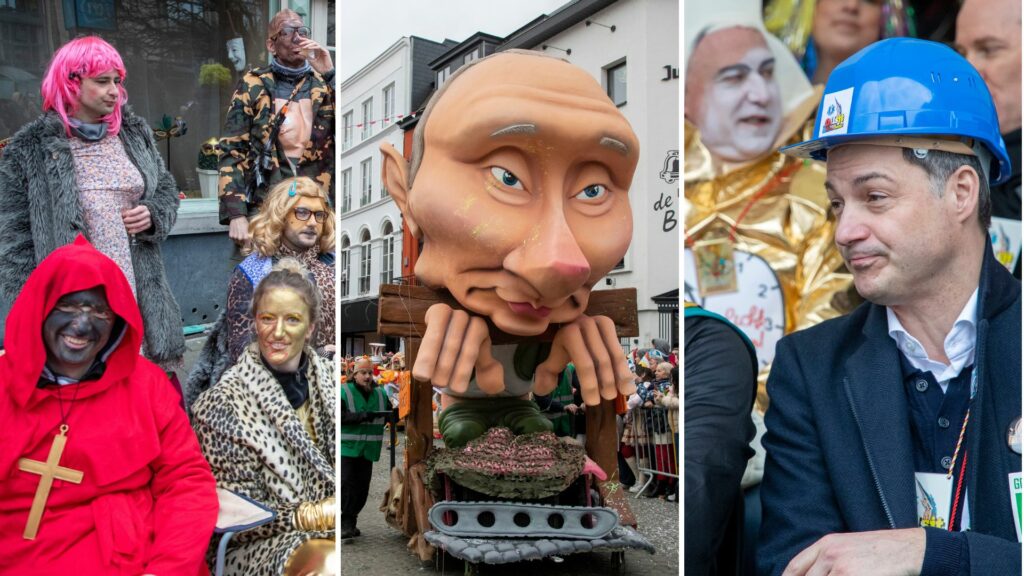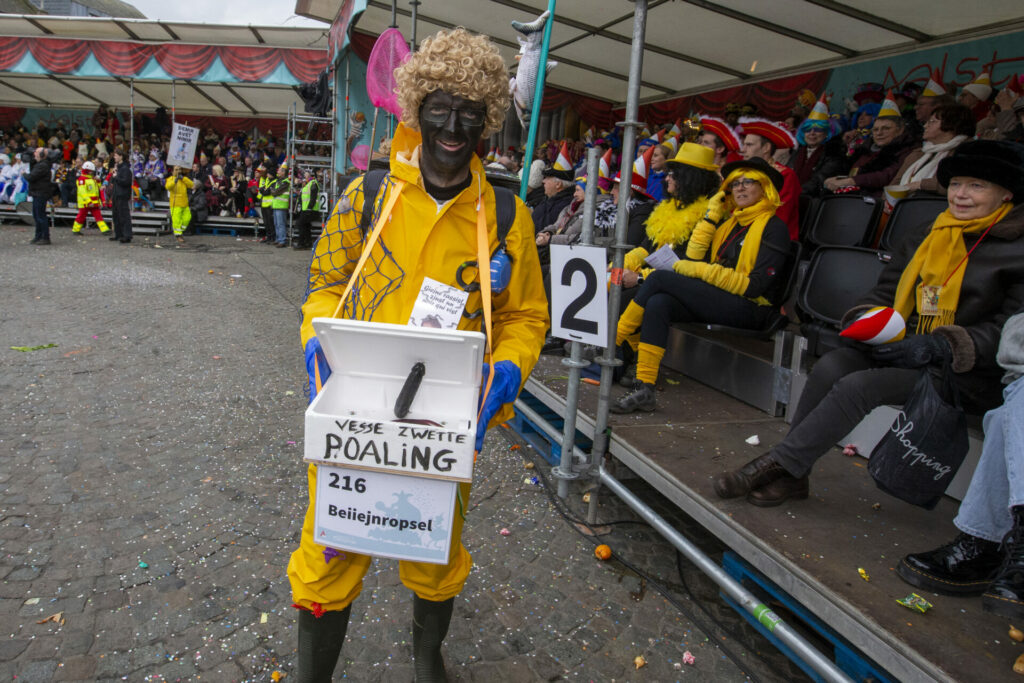On the face of it, the Aalst carnival is quite a spectacle, with gaudy floats trundling through the small Flemish town about 30km northwest of Brussels bearing oversize caricatures of politicians or local characters. For the uninitiated, it's an overdose of beer-fuelled tomfoolery and er... Belgian taste.
But despite the palpable spirit of bawdy silliness, is the event all innocent merriment in good faith? On a bike ride out of Brussels on Monday, I chanced upon proceedings and was wowed by the nuttiness of it all, the onslaught of clashing primary colours, trashy tunes, and clear irreverence for our daily decorum. Were it not for my cycling outfit, I might have been tempted from the sidelines into the dancing throngs.
Caught in the madness of it all, the invitation to enter into the revelry can obscure more contentious episodes in the carnival's history. What its proponents proclaim to be nothing more than a general impiety directed at no one in particular (which is to say, everyone), that argument loses weight among minorities and groups who have historically been stigmatised in Western culture.
Whilst many of us consider the debate closed about whether it's acceptable to wear blackface in this day and age, there remain a few who see this as a harmless outfit that has its place among the multitudes of merry-makers. Certainly, there are plenty of other displays of transgression, from adults boasting babyish bonnets to grown men baring their bums for a spank. Isn't it all just a bit of fun?
The jocular anything-goes attitude is definitely a laugh. But then we might wonder where to draw the line between flirting with controversy and reviving stereotypes that are widely considered passé. To deny the difference between innocuous poking fun and being the butt of every joke is not only disingenuous but indicates a position of privilege that is too often overlooked.
It's a problem Aalst Carnival has been facing for years: though fans laud it as a chance to celebrate all that's louche, critics will point out that it was stripped of its UNESCO intangible heritage status. And the town's mayor seems rather lax on complaints of sexual harassment, apparently of the view that this is an unfortunate but inevitable part of the amusement. The same mayor proudly announced that this year's theme was to ridicule "woke" – as if the event risks being cancelled by a sense of humour failure.
Does Aalst need to clear its act up or are we missing the joke? Let @Orlando_tbt know.
Belgium in Brief is a free daily roundup of the top stories to get you through your coffee break conversations. To receive it straight to your inbox every day, sign up below:
1. Brussels Justice Palace to break free from 'steel cage' in 2024
After the summer of 2023 – more than 40 years since the scaffolding went up – the restoration works on the Justice Palace in Brussels can finally begin, leading to the long-overdue liberation of the Palais from its steel cocoon, announced State Secretary Mathieu Michel, in charge of the Buildings Agency. Read more.
2. Despite previous racism controversies, Aalst Carnival participants don blackface
After two years without an Aalst Carnival parade due to the Covid-19 pandemic, this year's edition of the controversial three-day event again raised eyebrows as some participants were photographed proudly donning blackface. Read more.
3. 'Toxic' bosses biggest cause for burnout among Belgians, study shows
Only one in three workers in Belgium have bosses whose management styles actively prevent employees' burnout, La Dernière Heure (DH) reports. Read more.
4. App tracks women's feelings of vulnerability in Brussels for targeted intervention
A Brussels university has launched an app to better register women's experiences on the street in order to systematically tackle the issue of safety. In spite of Brussels authorities having recently started stepping up efforts to design female-friendly spaces, many women continue to feel unsafe on its streets. Read more.
5. EU dismisses report that US blew up Nord Stream pipeline as 'speculation'
The EU has dismissed the claim that the US blew up the Nord Stream underwater gas pipelines between Russia and Germany as "speculation", and stated that only an official investigation is capable of concluding who actually committed the "deliberate act of sabotage." Read more.
6. 'Becoming a taxi service': Brussels firefighters overwhelmed by ambulance call-outs
After being on the rise for a decade, the number of ambulance interventions carried out by the Brussels fire brigade hit a new record in 2022, leading the public sector union to sound the alarm about the unsustainable state of affairs. Read more.
7. Hidden Belgium: Au Laboureur
The café Au Laboureur in Brussels’ Rue de Flandre has preserved the relaxed charm of old Brussels even if the neighbourhood has become quite hipster. The interior is decorated with antique beer signs, round mirrors and an old telephone booth. Read more.


